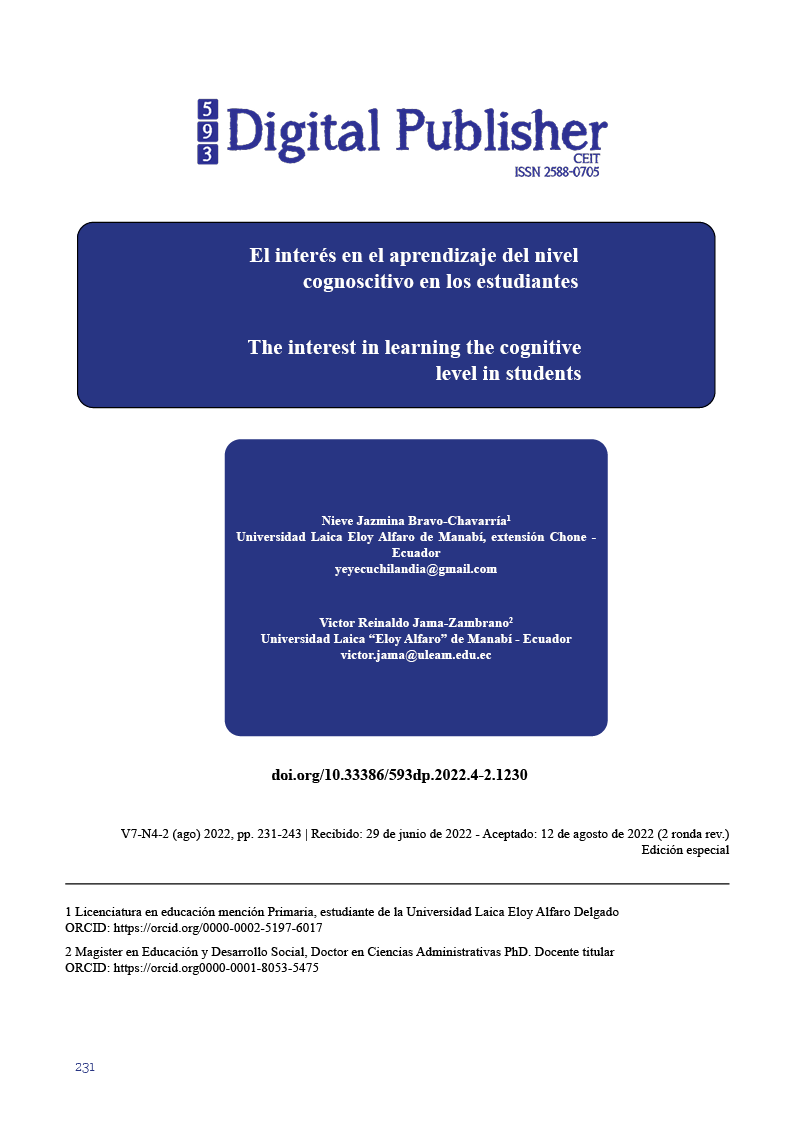The interest in learning the cognitive level in students
Main Article Content
Abstract
This work aims to determine how interest influences the learning of the cognitive level of the students of the Educational Unit Dr. Odilón Gómez Andrade of the Chone canton. This study is of the explanatory, inductive and deductive correlational type, which is used to expose the analogies and correlations, is supported by a multimodal or mixed approach (qualitative and quantitative). The information collection technique was a test applied to the 54 students of the middle sublevel of the institution involved. The results show that in the face of the accelerated production of knowledge, the students expressed enthusiasm when carrying out the tasks and finishing them with the same attitude, which stimulates the teacher to gradually practice the use of motivation to encourage participation, but establishing the respect by taking turns, accepting the different criteria of the group and maintaining order. This makes clear to us the changes between the old school and the new school. It can be concluded that the Ministry of Education, in addition to generating demands for knowledge, must also train its professionals so that they are prepared to face different social problems and individual cognition of each student, since they come from different social and family contexts. -beef. Interest should be one of the elements that the teacher will innovate, through various options that generate it within the classroom, so that students gain a more effective cognitive level in the school stage, for their academic preparation and social development.
Downloads
Article Details

This work is licensed under a Creative Commons Attribution-NonCommercial-ShareAlike 4.0 International License.
1. Derechos de autor
Las obras que se publican en 593 Digital Publisher CEIT están sujetas a los siguientes términos:
1.1. 593 Digital Publisher CEIT, conserva los derechos patrimoniales (copyright) de las obras publicadas, favorece y permite la reutilización de las mismas bajo la licencia Licencia Creative Commons 4.0 de Reconocimiento-NoComercial-CompartirIgual 4.0, por lo cual se pueden copiar, usar, difundir, transmitir y exponer públicamente, siempre que:
1.1.a. Se cite la autoría y fuente original de su publicación (revista, editorial, URL).
1.1.b. No se usen para fines comerciales u onerosos.
1.1.c. Se mencione la existencia y especificaciones de esta licencia de uso.
References
Albán, J. (2018). “Estrategias que utilizan los estudiantes para la resolución de un problema ma-temático y su incidencia en el rendimiento académico. Tesis previa a la obtención del título de Magíster en Docencia de las Matemáticas. Facultad de Filosofía, Letras y Ciencias de la Educación Maestría en Docencia de la Matemática II cohorte. https://dspace.ucuenca.edu.ec/bitstream/123456789/30607/1/trabajo%20de%20titulaci%C3%B3n.%20pdf.pdf
Carrillo Tamayo, O. A. (2013). El desarrollo psicológico en la práctica educativa. Http://104.207.147.154:8080/handle/54000/1307
Carroll, B. J., & Davidson, J. R. (2000). Screening Scale for DSM-IV GAD. Copyright.
Chiriboya, S. (2017). La carencia de interés en el aprendizaje y su incidencia en el rendimiento académico de los estudiantes de los terceros años, paralelos “A”, “B” y “C” de Educación Básica de la “Unidad Educativa Ambato” del cantón Ambato, provincia de Tungurahua. In-forme final del Trabajo de Graduación o Titulación previo a la Obtención del Título de Li-cenciado en Ciencias de la Educación, Mención: Educación Básica. Universidad Técnica de Ambato. Facultad de Ciencias Humanas y de la Educación Carrera de Educación Básica Modalidad Semipresencial. Https://repositorio.uta.edu.ec/bitstream/123456789/26068/1/0502139017%20Chiriboga%20Rosero%20Sandra%20Margoth.pdf
Duran, D. (2014). Aprenseñar: Evidencias e implicaciones educativas de aprender enseñando. Narcea, S.A. ediciones. Https://bit.ly/3tfai8i
Fontán, L. (2015). Semiología de la Memoria. Tendencias En Medicina, 10, 151–157. Http://tendenciasenmedicina.com/Imagenes/imagenes10p/art_24.pdf
Iscalá Tobito, D. Del P., & Santafé Rodríguez, Y. A. (2021). Incidencia de la motivación del estudiante de básica primaria en el área de Matemática desde el uso de la virtualidad en tiempos complejos: Una mirada desde la experiencia pedagógica de la educacición colombiana. Trascendere, 2(3). Http://www.revistas.upel.edu.ve/index.php/trascendere/article/view/9604
Jama-Zambrano, V. R., & Cornejo-Zambrano, J. K. (2018). Las Didácticas Mentefactuales Proposicionales como propuesta innovadora en el proceso enseñanza aprendizaje del área de Desarrollo de Pensamiento en los estudiantes. Polo Del Conocimiento, 3(3), 65–87. Https://doi.org/10.23857/PC.V3I3.445
Leiva, C. (2005). Conductismo, cognitivismo y aprendizaje. Revista Tecnología En Marcha, 18(1), 66–73. Https://181.193.125.13/index.php/tec_marcha/article/view/442
Llanga Vargas, E. F., Logacho, G., & Molina, L. (2019). La memoria y su importancia en los procesos cognitivos en el estudiante. Revista Atlante: Cuadernos de Educación y Desarrollo, En Línea. Https://www.eumed.net/rev/atlante/2019/08/memoria-importancia-estudiante.html
Moreira-Chóez, J. S., Beltron-Cedeño, R. A., & Beltrón-Cedeño, V. C. C. (2021a). Aprendizaje significativo una alternativa para transformar la educación. Dominio de Las Ciencias, 7, 915–924. Https://dominiodelasciencias.com/ojs/index.php/es/article/view/1835/3708%0A
Moreira-Chóez, J. S., Beltron-Cedeño, R. A., & Beltrón-Cedeño, V. C. C. (2021b). Aprendizaje significativo una alternativa para transformar la educación. Dominio de Las Ciencias, 7(2), 915–924. Https://doi.org/10.23857/DC.V7I2.1835
Moreira-Choez, J. S., Mera-Plaza, C. L., Hernández-Solís, A. A., & Lozada-Almendariz, F. E. (2022). Competencias en investigación de los docentes de institutos técnicos y tecnológicos en el contexto de la educación superior. Revista Científica Arbitrada de Investigación En Comunicación, Marketing y Empresa REICOMUNICAR. ISSN 2737-6354., 5(9), 8–28. Https://doi.org/10.46296/RC.V5I9.0033
Organización de las Naciones Unidas para la Educación, la C. Y la C. (UNESCO). (2009). Cconferencia Mundial sobre la Educación Superior 2009: La nueva dinámica de la educación superior y la investigación para el cambio social y el desarrollo, communiqué - UNESCO Biblioteca Digital. UNESCO, 10. Https://unesdoc.unesco.org/ark:/48223/pf0000183277_spa
Pinargote-Macías, E. I., Vega Intriago, J. O., Moreira Choez, J. S., & Díaz Macías, T. M. (2022). Competencias del docente universitario en tiempos de pandemia. Revista Venezolana de Gerencia, 27(7), 347–359. Https://doi.org/10.52080/RVGLUZ.27.7.23
Renninger, K. A., Nieswandt, M., & Hidi, S. (2015). Interest in mathematics and science learning. Https://www.jstor.org/stable/j.ctt1s474j0
Ruiz de Gauna, P., González Moro, V., & Morán-Barrios, J. (2015). Diez claves pedagógicas para promover buenas prácticas en la formación médica basada en competencias en el grado y en la especialización. Educación Médica, 16(1), 34–42. Https://doi.org/10.1016/J.EDUMED.2015.04.005
Sellan Naula, M. E. (2017). Importancia de la motivación en el aprendizaje. Revista Electrónica Sinergias Educativas, 2(1). Http://portal.amelica.org/ameli/jatsrepo/382/3821587003/3821587003.pdf
Torres Rivera, A. D., Badillo Gaona, M., Valentin Kajatt, N. O., & Ramírez Martínez, E. T. (2014). Las competencias docentes: el desafío de la educación superior. Innovación Educativa (México, DF), 14(66). Http://www.scielo.org.mx/scielo.php?Pid=S1665-26732014000300008&script=sci_arttext
Victimilla, M (2019) La educación artística y sus problemas: Consideraciones en torno al caso de Ecuador. Revista de investigación y Pedagogía del Arte. Facultad de Artes. Universidad de Cuenca; Número 6, julio-diciembre 2019. ISNN 2602-8158
Zepeda Solbes, J., Montserrat, R, & Furió, C. et al. (2007). El desinterés del alumnado hacia el aprendizaje de la ciencia: implicaciones en su enseñanza-Hernández, S., Abascal-Mena, R., & López-Ornelas, E. (2016). Integración de gamificación y aprendizaje activo en el aula. Ra Ximhai, 12(6), 315–325. Https://www.redalyc.org/articulo.oa?Id=46148194022
Solbes, J., Montserrat, R, & Furió, C. et al. (2007). El desinterés del alumnado hacia el aprendizaje de la ciencia: implicaciones en su enseñanza. Departamento de Didáctica de las Ciencias Experimentales y Sociales. Universitat de València. DIDÁCTICA DE LAS CIENCIAS EXPERIMENTALES Y SOCIALES. N.º 21. 2007, 91-117 (ISSN 0214-4379) Dialnet- DesinteresDelAlumnadoHaciaElAprendizajeDeLaCiencia-2475999.pdf
Hernández Pina, F., García Sanz, M. P., Martínez Clares, P., Hervás Avilés, R. M., & Maquilón Sánchez, J. et al. (2002). CONSISTENCIA ENTRE MOTIVOS Y ESTRATEGIAS DE APRENDIZAJE EN ESTUDIANTES UNIVERSITARIO. Consistencia entre motivos y es-trategias de aprendizaje en estudiantes universitarios 487 RIE, vol. 20-2 (2002) Revista de Investigación Educativa, 2002, Vol. 20, n.º 2, págs. 487-510. Universidad de Murcia
Flavell, J., et al. (1992). Desarrollo cognitivo: pasado, presente y futuro. Developmental Psy-chology (1992), Vol. 28, No. 6, pp. 998-1005. DEPARTMENT OF PSYCHOLOGY, STANFORD UNIVERSITY, CALIFORNIA, US.
Mazzoni, C. C., Stelzer, F., & Cervigni, P, M, et al. (2014). Impacto de la pobreza en el desarro-llo cognitivo. Un análisis teórico de dos factores mediadores. liber. vol.20 no.1 Lima ene. 2014
Rojas Plasencia, D, A, & Camejo Puentes, M, et al. (2010). Niveles de asimilación y niveles de desempeño cognitivo: reflexionemos. Centro de procedencia: Universidad de Ciencias Pe-dagógicas "Rafael María de Mendive"
Barrantes, R. et al. (2014). Investigación: Un camino al conocimiento, Un enfoque Cualitativo, cuantitativo y mixto. San José, Costa Rica: EUNED.
Dávila, g, et al. (2006). EL RAZONAMIENTO INDUCTIVO Y DEDUCTIVO DENTRO DEL PROCESO INVESTIGATIVO EN CIENCIAS EXPERIMENTALES Y SOCIALES. Re-vista de Educación, Año 12, Número Extraordinario, 2006. Universidad Pedagógica Expe-rimental Libertador Instituto Pedagógico “Rafael Alberto Escobar Lara” de Maracay



